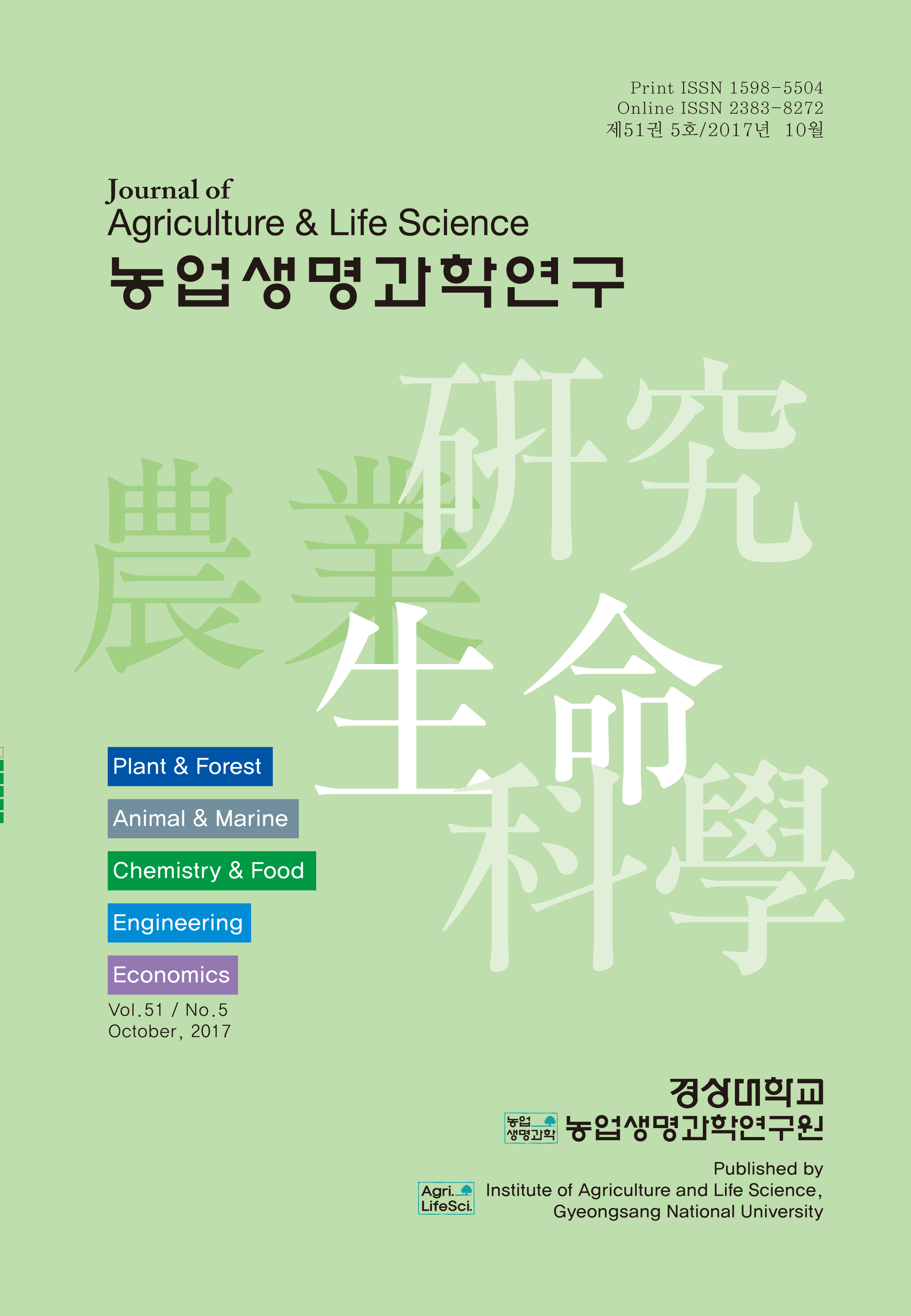본 연구는 grooming brush의 제공에 따른 한우 암소 육성우의 사양성적, 행동특성, 혈액 내 cortisol 및 혈액성상의 변화를 조사하였다. 6개월령의 암소 육성우(110.63±12.23kg) 32두를 32m2 우방에서 대조구(non grooming brush), 처리구 1(Chevron angle type grooming brush, CHAT), 처리구 2(Straight type grooming brush, ST) 및 처리구 3(Chevron angle type and Straight type grooming brush, CHAST)으로 처리당 4두씩, 4처리 2반복으로 완전임의 배치하여, 2주간 예비시험 후 8개월간 본 시험을 실시하였다. 시험결과 grooming brush 제공에 따른 사양성적으로 종료 시 체중과 일당증체량에서는 대조구 대비 처리구에서 유의적(p<0.05)으로 증가하였고, 사료요구율에서는 대조구에서 가장 낮은 사양성적을 보였다(p<0.05). 행동특성 중 횡화 및 걷기시간은 대조구 대비 grooming brush를 제공한 모든 처리구에 유의적으로 높게 나타났다(p<0.05). 음수행동의 빈도는 처리구 3에서 유의적(p<0.05)으로 증가하였다. 또한, 몸단장행동인 자기몸 핥기, brushing 행동과 투쟁행동은 대조구에서 다른 처리구에 비해 유의적으로 증가하였다(p<0.05). 혈액성상에서 헤모글로빈수치는 처리구에서 유의적(p<0.05)으로 높았고, 스트레스 호르몬인 cortisol 농도는 대조구에서 유의적(p<0.05)으로 높은 수치를 보였다. 따라서, grooming brush 제공에 따른 한우 육성 성적, 행동특성 그리고 혈액 내 cortisol의 변화는 집단생활을 하는 소의 사회적인 행동에 긍정적인 영향을 미치는 것으로 볼 수 있으며, 스트레스 저감으로 인해 건강한 발육에 기여하는 것으로 나타났다.
The objective of the study was to compare effects of installed grooming brushes on growth performance, behavior characteristics, and blood composition including cortisol levels. Thirty two heads growing Hanwoo heifers(110.6 ± 12.2 kg) at 6 months age were randomly allocated 4 heads into each treatments which were Control, Treatment 1(Chevron angle type grooming brush, CHAT), Treatment 2(Straight type grooming brush, ST), and Treatment 3(Chevron angle type and straight type grooming brush, CHAST). There were pre-experiment for 2 weeks period, and then the present investigations were counducted for 8 months period. Final body weight, average daily gain were highest in the treatment 3 group(p<0.05), and lowest in the control group(p<0.05) among the treatments. Feed conversion ratio was excellent for treatment 2 or 3 groups. Behavioral characteristics, lying down time was significantly longer(p<0.05) in the treatment 3 group compared to control group. Walking time was higher in the treatments group than the control group(p<0.05). Drinking frequency was significantly increased in treatment 3(p<0.05). Also, body care behavior, such as licking, rubbing, brushing, and aggressive were increased in the control group than treatment group(p<0.05). As the blood composition, hemoglobin levels showed significantly lower in the control group(p<0.05). Cortisol levels showed significantly higher in the control group compared with other groups(p<0.05). Therefore, the grooming brush could have desirable positive effects such as growth performance, behavior and stress in relation to blood cortisol level in rasing cattle. Also, the present results indicating that supplementation of grooming brush could contribute to improve animal welfare in Hanwoo management.


